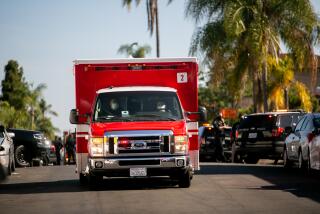The Fight Against Crime: Notes From The Front : Paramedics Armed With New Caution
- Share via
The threat of AIDS, which has changed the way many Americans approach their lives, has also affected the way police officers and paramedics respond to trauma incidents.
Procedures once considered routine, like assisting bleeding victims or applying mouth-to-mouth resuscitation, are now approached with noticeable precautions.
In the movies, able-bodied police officers fought through gawking crowds and offered their lips to those not breathing or applied pressure to bleeding wounds. It was the way they had been taught to respond--thinking first of the victims.
“We had no way of knowing if someone had AIDS,” says Los Angeles Police Lt. Dan Hoffman of the Valley Bureau, about the way officers used to assist people. “It’s not like people walk around with signs on their chest.”
But the possibility of rescue personnel or police officers catching a communicable disease while on the job has increased with the spread of AIDS. Safety is an issue more than ever before.
“They don’t necessarily fear getting a disease as much as they are just concerned about transferring something to their families, even if it’s just a cold,” said Los Angeles Fire Department Capt. Lynn Donaldson, who supervises an Emergency Medical Services team from Granada Hills.
To combat contagious diseases, in the last five years or so, all police cars in Los Angeles have been equipped with more extensive first-aid kits. The kits now include gloves and face masks, like those doctors wear, for use in cases where officers feel their health may be at risk.
Also being used by many workers is a device called the “one-way valve.” The valve, which can be bought at some drug stores, stops the air from re-entering the attendant’s mouth when he or she is giving mouth-to-mouth resuscitation. It lets the officer blow in, but stops the unconscious person from exhaling into the officer’s mouth.
Donaldson said the National Transportation Safety Board has mandated that all agencies transporting patients or responding to calls for help must have a basic supply of items to help decrease the chances of spreading disease.
Despite all the attention that AIDS has garnered, Donaldson said the disease is not the only one paramedics fear catching.
“We have now universal precautions about not just AIDS but also things like tuberculosis and hepatitis,” Donaldson said. “We use gloves whenever there is body fluid. And we use face protectors when someone is coughing or sniffling.”
And apart from the threat of catching a disease from a patient is the all too real, but frequently overlooked reverse scenario: “Officers also have to make sure they are not giving something to people they are assisting,” Donaldson said.
Donaldson said there is no evidence that suggests a paramedic in Los Angeles has ever died because of a disease contracted while working.
For LAPD officers, using the face protectors or one-way valves is optional, but strongly recommended by department officials.
“The kit is there for safety and health reasons,” Hoffman said. “It’s up to the officers to use it if they want to or see fit.”
There are complications in choosing whether to help someone and wondering if your assistance may be putting your own life in jeopardy. To Hoffman, it’s still a judgment call.
“If someone is unconscious and has AIDS, there is no way of knowing,” he said. “It’s not like they can tell you.”
More to Read
Sign up for Essential California
The most important California stories and recommendations in your inbox every morning.
You may occasionally receive promotional content from the Los Angeles Times.













